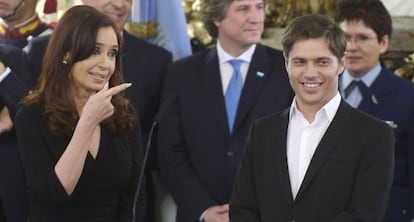Argentinean president’s Cabinet shifts keep critics at bay – for now
Fernández de Kirchner hopes to rein in inflation and plug the massive flow of cash reserves


It is too early to tell if the recent Cabinet shuffle made by President Cristina Fernández de Kirchner was just a superficial move, or was aimed at controlling Argentina’s spiraling inflation, as well as stopping the massive losses of the country’s cash reserves seen over the past three years.
After spending 45 days out of the public eye as she recovered from surgery to remove a blood clot near her brain, Fernández de Kirchner surprised many of her closest advisors – as well as throwing off critics – with a series of changes that are being viewed as moves that will allow her to closely control her administration’s economic agenda.
As she made her first appearance before a TV camera on November 18 – in a video recorded by her daughter Florencia – Fernández de Kirchner appeared relaxed, thanking those who had sent her get-well wishes and gifts. She didn’t discuss politics but instead held up a puppy given to her by Adán Chávez, the brother of the late Venezuelan President Hugo Chávez.
No one knew that just before that six-minute video was taped Fernández de Kirchner had just signed a series of measures that included major changes to her economic team.
Her secretary of state for the economy, Axel Kicillof, was appointed economic minister, and Chaco province governor Jorge Capitanich, a powerful Kirchnerite leader, was named cabinet chief.
Kicillof is a former professor of economic history who received one of the highest grades ever obtained at the University of Buenos Aires. Unlike Capitanich, who presents the pragmatic image of a solid politician, Kicillof is a die-hard leftist.
Guillermo Moreno, the controversial former secretary of state for trade, who also got caught up in the shuffle, used to refer to Kicillof as “the soviet.” Kicillof, though, has never admitted being a Marxist even though he has studied Marxism in depth.
Kicillof and Capitanich, who also has a background in economics, have known each other for 15 years. The pair is now poised to tackle two of Argentina’s biggest economic problems: high inflation, which stands at 25 percent; and the meltdown of the nation’s cash reserves, which have dwindled to $33.232 billion in October from $47.959 billion in February 2010. In three years, Argentina has lost $14.727 billion.
This government is not going to do anything to hurt the workers or business owners ”
Since their appointments, the two have not stopped working, and held a marathon session over the three-day weekend – (Monday was a holiday in Argentina). “This government is not going to do anything to hurt the workers or business owners,” Kicillof said. The fruits of their labor were seen when the Argentinean government announced on Tuesday that it had reached a preliminary deal with Spanish oil giant Repsol and Mexico’s Pemex over the expropriation of the former's YPF affiliate.
Following Kicillof’s promotion, the opposition press was quick to point out that he has always been the official who really makes the economic decisions in Fernández de Kirchner’s government. He was, in fact, instrumental in expropriating Repsol affiliate YPF in July 2012.
Moreno – who has been accused of fudging official inflation and growth statistics, actions that prompted the International Monetary Fund (IMF) to issue stern warnings – presented his resignation the day after the cabinet changes. He was appointed as Argentina’s ambassador to Rome.
The day after she taped her video, Fernández de Kirchner addressed a large group of young supporters who belong to her party faction’s influential youth wing, La Campora, which is headed by her son Máximo Kirchner. She praised her government’s decision in nationalizing YPF, saying that the Argentinean petroleum firm had reached its fifth consecutive month in increasing oil and gas production, and announced that her government was going to “expand the model,” but provided no further details.
The president didn’t mention the disastrous results of the October 27 regional and local elections, in which her faction lost in five of the most important districts in the country.
It is still early to say whether the changes she made to her Cabinet were just cosmetic or actually will serve to help pull the country out of its current economic crisis. But they also appear to be part of a gamble to win back voter confidence after her five-week absence. For now, some opposition lawmakers and media outlets that are usually critical of the government have remained quiet about her chess moves, while they wait to see if the economy does indeed make a sharp about turn.
Tu suscripción se está usando en otro dispositivo
¿Quieres añadir otro usuario a tu suscripción?
Si continúas leyendo en este dispositivo, no se podrá leer en el otro.
FlechaTu suscripción se está usando en otro dispositivo y solo puedes acceder a EL PAÍS desde un dispositivo a la vez.
Si quieres compartir tu cuenta, cambia tu suscripción a la modalidad Premium, así podrás añadir otro usuario. Cada uno accederá con su propia cuenta de email, lo que os permitirá personalizar vuestra experiencia en EL PAÍS.
¿Tienes una suscripción de empresa? Accede aquí para contratar más cuentas.
En el caso de no saber quién está usando tu cuenta, te recomendamos cambiar tu contraseña aquí.
Si decides continuar compartiendo tu cuenta, este mensaje se mostrará en tu dispositivo y en el de la otra persona que está usando tu cuenta de forma indefinida, afectando a tu experiencia de lectura. Puedes consultar aquí los términos y condiciones de la suscripción digital.








































